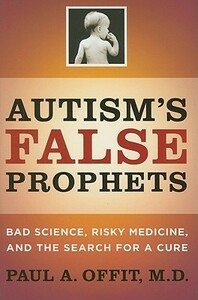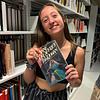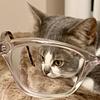Take a photo of a barcode or cover
9 reviews for:
Autism's False Prophets: Bad Science, Risky Medicine, and the Search for a Cure
Paul A. Offit
9 reviews for:
Autism's False Prophets: Bad Science, Risky Medicine, and the Search for a Cure
Paul A. Offit
informative
medium-paced
Great information, other than being a little outdated (although unfortunately still relevant). You can tell the guy is a virologist and not an author though…
This is a good science-based resource for anyone on the fence about whether vaccines cause autism or about the importance of vaccinations in general. While the arguments presented are based on hard science and epidemiological studies the material is written for lay people in and understandable way.
"The Panic Virus" by Seth Mnookin is also an excellent, and highly readable, science-based source for anyone examining the vaccine-autism controversy.
"The Panic Virus" by Seth Mnookin is also an excellent, and highly readable, science-based source for anyone examining the vaccine-autism controversy.
Although undoubtedly fastidiously researched, the fundamental flaw of this book cannot be overcome- the author comes from a POV that autism is a thing to be cured. That premise and the constant focus on the parents of autistic children, rather than the autistic people themselves, was simply too off-putting.
Graphic: Ableism, Child abuse, Medical content, Medical trauma
Another solid science book exposing the denialism in society, with an more focused look at vaccines and autism. A very worthwhile read for anyone, whether you have an autistic child or not.
A well-written, eye opening book about the controversy surrounding autism and vaccines. Dr. Offit clearly lays out what is science and what is not in terms of this debate, and brings about the very clear conclusion that vaccines do not cause autism. Offit also outlines the serious damages caused by people like Andrew Wakefield, David Kirby, and Jenny McCarthy. An extremely interesting book, and one that I think that the entire public should read before making blanket statements about the autism/vaccine controversy.
Absolutely one of the best scientific books I have read in years. It is engaging while informative and boldly tackles a topic that should raise far greater concern than it seems to do. I highly recommend this book, particularly to anyone who is contemplating whether or not to vaccinate a child.
This book plays an important role in making a clear statement about the bizarre politics and pseudoscience of the anti-vaccine movement. The writing is not brilliant, however, and the tone of the book occasionally verges on the hysterical. The author is at his best on the science of vaccines, which is his area of expertise. Most of the book, however, is about politics, journalism, sociology or psychology (occasionally psychopathology), and on all of these topics the Offit has mainly boilerplate and platitudes to offer. Quack treatments have a long history, and are the subject of extensive research, but the discussion in this book makes little reference outside of itself.
Damned statistics. For every study that shows there could be a link between vaccines and autism, there is one that appears to show no link. The truth (and cause of autism) is out there somewhere. I wish the two "sides" of the issue would just drop their differences and work on finding something genuine that could assist parents to help their autistic children.
Offit's book is pretty much a response to Evidence of Harm and I found it to be quite snarky and condescending in tone. I really didn't care for some of his conclusions: There is no connection whatsoever between vaccines and autism. Done deal. Those who think there is a connection are simply fools. One must be a scientist to really understand what is going on. Alternative therapies are always bogus. The media is evil. Especially Oprah. Parents are stupid and will believe anything when desperate. Lawyers just want money. The "legitimate" government agencies and pharmaceutical companies have our best interests at heart. Only trained scientists or doctors are qualified to interpret or conduct valid studies.
I don't always accept these conclusions. Sometimes they are true and other times they are not. I got tired of wading through the condescension to get to the autistic plot thread.
I still don't know...
Offit's book is pretty much a response to Evidence of Harm and I found it to be quite snarky and condescending in tone. I really didn't care for some of his conclusions: There is no connection whatsoever between vaccines and autism. Done deal. Those who think there is a connection are simply fools. One must be a scientist to really understand what is going on. Alternative therapies are always bogus. The media is evil. Especially Oprah. Parents are stupid and will believe anything when desperate. Lawyers just want money. The "legitimate" government agencies and pharmaceutical companies have our best interests at heart. Only trained scientists or doctors are qualified to interpret or conduct valid studies.
I don't always accept these conclusions. Sometimes they are true and other times they are not. I got tired of wading through the condescension to get to the autistic plot thread.
I still don't know...
Paul Offit received death threats after writing this book, which is a shame. While I am not one to take any one author's view as my own completely, I do think that the world needs more information from this side of the coin so that critical thinking can be done. We must ask ourselves questions, and look for the answers from all sources. I enjoyed reading a book that I feel really adds a fresh, science-based perspective to the dialogue on the causes of autism.






